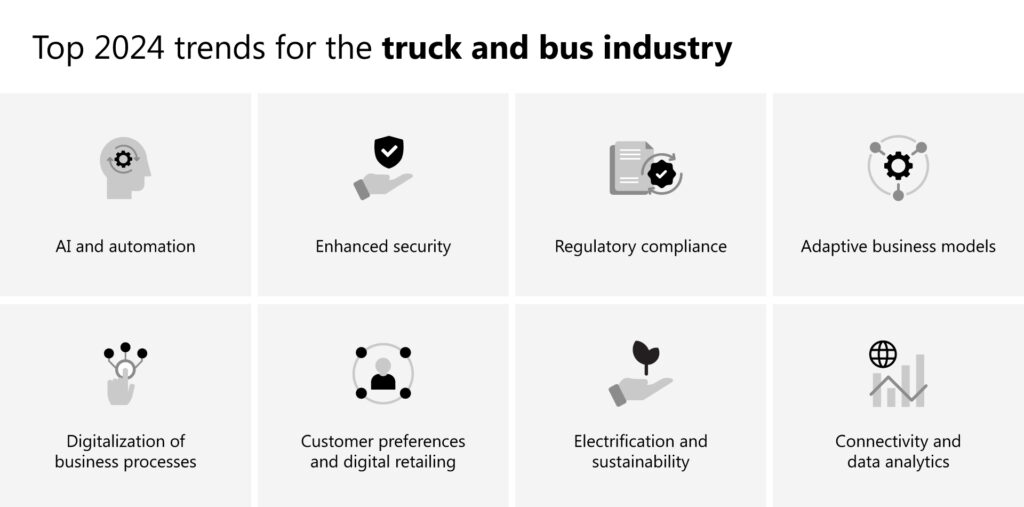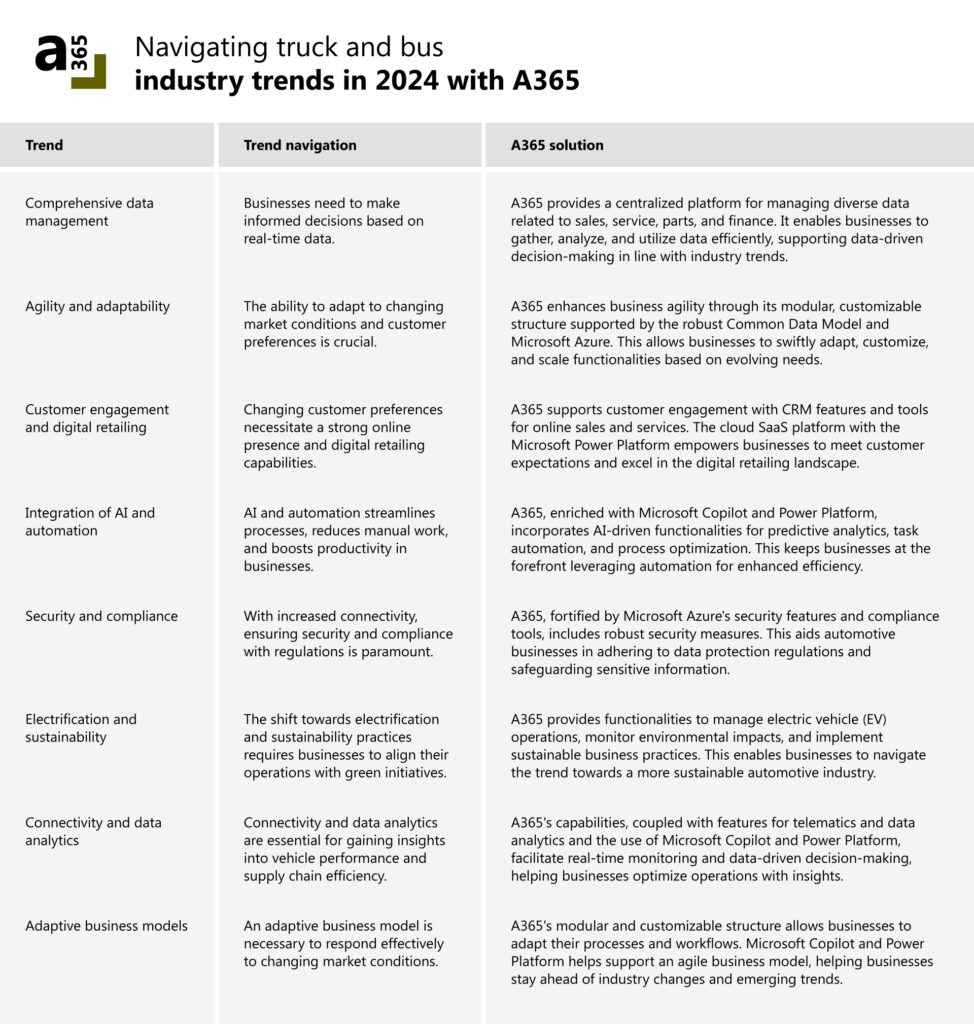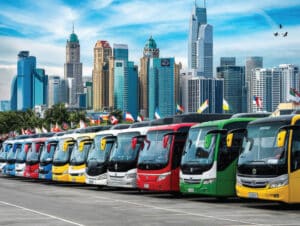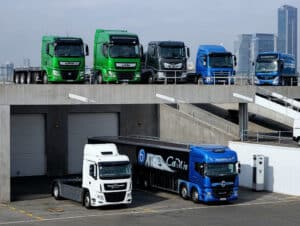The truck and bus industry is undergoing a profound transformation, driven by a multitude of trends that are reshaping business landscapes globally. Businesses operating in this sector must adapt to these trends to remain competitive, enhance operational efficiency, and meet evolving customer expectations.
In this comprehensive guide, we will delve into key trends such as business processes, Artificial Intelligence (AI), customer preferences, digital retailing, enhanced security, electrification, sustainability, connectivity, data analytics, and more.
We will explore the impacts of these trends on truck and bus businesses and outline actionable strategies to ensure they stay on top of these dynamic changes.
Top 2024 trends for the truck and bus industry

- Digitalization of business processes
Trend: The digitalization of business processes involves the widespread adoption of technologies such as cloud computing, software solutions, and Internet of Things (IoT) devices to optimize and streamline operations.
Impact: This trend leads to improved efficiency, transparency, and communication within the truck and bus industry. Real-time monitoring allows for better decision-making, reducing delays and increasing overall productivity.
Action: Businesses should invest in integrated software solutions that cover various aspects of fleet management, supply chain, and logistics. Telematics and IoT devices can be implemented to collect and analyze data, providing valuable insights into vehicle performance and operational efficiency.
- AI and automation
Trend: The integration of AI involves leveraging algorithms and machine learning for tasks such as predictive maintenance, route optimization, and even the development of autonomous vehicles.
Impact: AI and automation contribute to improved operational efficiency by predicting and preventing maintenance issues, optimizing routes for fuel efficiency, and potentially reducing labor costs through autonomous technologies.
Action: Businesses should explore AI applications that align with their operational needs. This may involve implementing predictive maintenance systems, route optimization algorithms, and gradually incorporating autonomous technologies. Employee training programs are essential to ensure a smooth transition to automated processes.
- Customer preferences and digital retailing
Trend: Evolving customer preferences are shifting towards digital platforms, influencing the way truck and bus businesses interact with and serve their customers.
Impact: Businesses that adapt to these preferences by enhancing their online presence and providing real-time tracking options can build stronger customer relationships, improve satisfaction, and gain a competitive edge.
Action: Investment in user-friendly mobile apps, responsive websites, and digital communication channels is crucial. Additionally, businesses should explore real-time tracking solutions to provide customers with visibility into the status of their fleet, fostering transparency and trust within their respective businesses.
- Enhanced security
Trend: With increased connectivity, there is a growing need for robust cybersecurity measures to protect sensitive data and connected vehicle systems from potential threats.
Impact: Failure to address cybersecurity concerns can lead to data breaches, system malfunctions, and damage to a company’s reputation. Secure communication is essential to ensure the integrity and safety of the entire truck and bus ecosystem.
Action: Businesses must invest in advanced cybersecurity solutions, conduct regular security audits, and implement secure communication protocols. Employee training on cybersecurity best practices is crucial to create a culture of security awareness within the organization.
- Electrification and sustainability
Trend: The shift towards electrification is driven by environmental concerns and regulatory changes. Sustainable practices, including reducing emissions and adopting green technologies, are becoming integral to the industry.
Impact: Embracing electrification and sustainability practices can lead to reduced environmental impact, compliance with evolving regulations, and improved brand image, attracting environmentally conscious customers.
Action: Companies should evaluate the feasibility of integrating electric vehicles into their fleets, invest in charging infrastructure, and adopt sustainable logistics and transportation practices such as route optimization and efficient energy use.
- Connectivity and data analytics
Trend: Increasing reliance on connectivity, telematics, and data analytics for real-time monitoring and data-driven decision-making.
Impact: Businesses gain valuable insights into vehicle performance, driver behavior, and supply chain efficiency. Data analytics enable informed decision-making, leading to operational optimization and cost savings.
Action: Investment in telematics devices, IoT sensors, and advanced data analytics tools is essential. Businesses should establish robust data management practices, ensure data security, and harness the power of analytics to improve operations continuously.
- Regulatory compliance
Trend: Ongoing changes in regulations related to safety, emissions, and data privacy create a dynamic regulatory environment for the truck and bus industry.
Impact: Adherence to these regulations is crucial for avoiding legal consequences, financial penalties, and maintaining a positive brand image in a socially conscious market.
Action: Staying informed about regulatory changes, implementing compliance management systems, and conducting regular audits to ensure adherence to standards are essential steps. Collaborating with industry associations and regulatory bodies can provide valuable insights into upcoming changes.
- Adaptive business models
Trend: The need for adaptive business models that can respond to changing market conditions, emerging technologies, and evolving customer demands.
Impact: Businesses that embrace adaptability are better positioned to navigate uncertainties, capitalize on new opportunities, and remain competitive in a rapidly changing industry.
Action: Foster a culture of adaptability within the organization by encouraging innovation, flexibility, and a willingness to embrace change. Regularly assess the business model, explore new revenue streams, and stay agile in responding to market dynamics.
A365- A transformative force for unparalleled potential to navigate trends
In the ever-evolving landscape of the truck and bus industry, businesses seek not only solutions to current challenges but also a robust platform that propels them toward future success.
Annata’s A365, built upon the extensive Annata and Microsoft Dynamics 365 technology stack, is a fully cloud-ready Software-as-a-Service (SaaS) platform that stands out as a surefire method for businesses to navigate industry trends and ride the waves of change.
Thriving on the robust Common Data Model and meticulously crafted with Microsoft Azure, A365 is enriched with cutting-edge technologies such as Microsoft Copilot and Microsoft Power Platform and is fortified by the invaluable wealth of decades of industry experience and expertise.
A365 can serve as a powerful tool for businesses to navigate through industry trends. By providing comprehensive data management, agility, customer engagement tools, integration of AI, security features, support for electrification and sustainability, connectivity and data analytics, and adaptive business model capabilities, A365 empowers businesses to not only ride industry waves but also stay at the forefront of innovation and competitiveness in a rapidly evolving market.
Navigating truck and bus industry trends in 2024 with A365

A365 emerges as a transformative solution that not only addresses industry trends but propels businesses toward a future of unparalleled potential. The combination of a robust platform, cloud readiness, cutting-edge technologies, and industry expertise positions A365 as a key enabler for businesses looking to navigate the dynamic landscape of the truck and bus industry.
To further discover how A365 can benefit your truck and business amid industry trends, reach out to us. Learn more about A365 for truck and bus businesses here.












